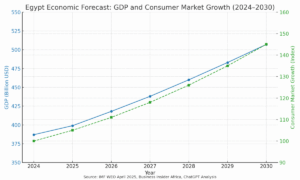In a testament to its evolving economic might, Egypt has been ranked by the International Monetary Fund (IMF) among Africa’s top economies for 2025, placing second only to South Africa in Gross Domestic Product (GDP). Egypt’s ascent is not merely a numerical achievement; it reflects a deeper structural shift that is positioning the nation as a global and regional investment magnet.
According to the IMF, Egypt’s GDP growth is not just about volume—valued at over $400 billion—but signals an economy transitioning toward diversification, industrial expansion, and sustainable development. These factors make Egypt increasingly appealing to multinational corporations looking for production hubs, consumer markets, and export gateways.
One of Egypt’s most powerful economic levers is its human capital. With a population exceeding 110 million—and growing—the country offers a unique blend of skilled yet cost-competitive labor. Engineering, IT, manufacturing, and service industries are particularly rich in talent, with Egyptian universities producing thousands of technically proficient graduates annually.
Compared to other production hubs like India, Morocco, Vietnam, China or even Eastern Europe, Egypt provides lower labor costs without compromising skill quality. This balance offers global manufacturers a compelling alternative, especially as labor costs rise sharply across Asia.
“Egypt’s labor force stands out for its strong technical education, multilingual capabilities, and adaptability, making it an ideal destination for companies seeking both efficiency and innovation,” notes Dr. Mahmoud El-Araby, an economist specializing in emerging markets.
At the same time, Egypt’s growing population represents a massive domestic consumer market, increasingly important for companies aiming to secure future demand. Rising urbanization rates, a burgeoning middle class, and an expanding digital economy are boosting consumption across sectors like FMCG (Fast Moving Consumer Goods), technology, real estate, healthcare, and financial services.
Forecasts suggest that Egypt’s consumer market will grow by over 25% by 2030, driven by young demographics and improving purchasing power. This offers businesses not just a place to produce, but a vibrant internal market eager for new products and services.
Strategically located at the crossroads of Africa, Europe, and Asia, Egypt offers unparalleled trade advantages. The Suez Canal remains one of the world’s most critical shipping arteries, and infrastructure investments—such as the massive New Administrative Capital and expanded industrial zones—are solidifying Egypt’s role as a regional logistics and production hub.
Egypt’s series of trade agreements, including membership in COMESA (Common Market for Eastern and Southern Africa), the African Continental Free Trade Area (AfCFTA), and various bilateral treaties with Europe and the Arab world, grant businesses preferential access to over 1.5 billion consumers globally.
Looking ahead, sectors primed for accelerated investment include:
- Manufacturing and Assembly: Electronics, automotive parts, textiles
- Renewable Energy: Solar, wind, and green hydrogen
- Digital Economy: Fintech, e-commerce platforms, software development
- Healthcare and Pharmaceuticals: Serving both domestic and African markets
- Real Estate and Urban Development: Driven by rapid urbanization
Within the current progress in sustaining Egypt’s reform momentum, the IMF projects the country to be one of the top 20 economies globally by 2040.
Moreover, global corporations are increasingly viewing Egypt not just as a standalone market, but as an ideal base to expand deeper into Africa and Globally, leveraging Egyptian expertise, trade links, and financing capabilities.



